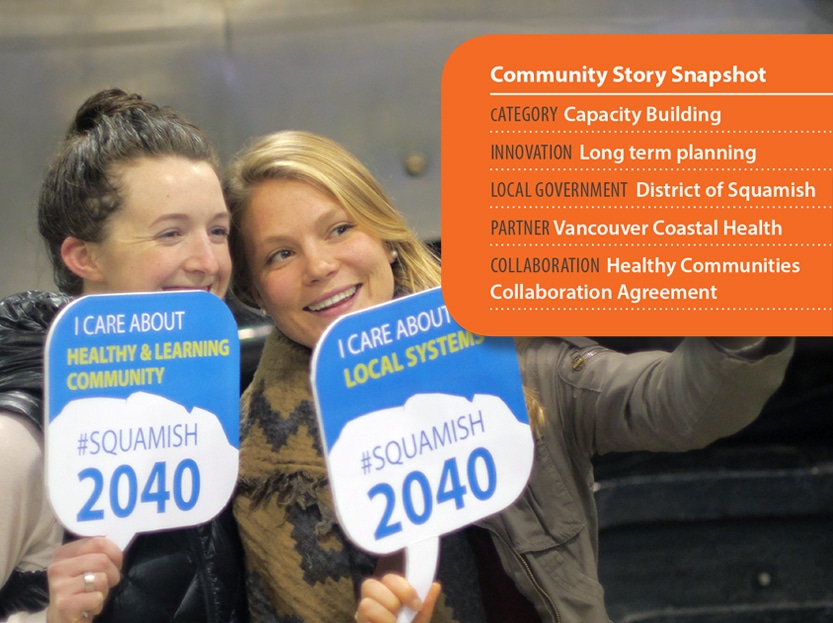As the population of Squamish Booms the District Brings a Health Focus into Long Term Planning and Capacity Building
There was an audible cheer in the Council Chambers at Squamish Municipal Hall. Council had just declared that the health, safety and well-being of children are foundational to the community and passed a motion to work with partners to develop a Squamish Children’s Charter.
The proposed Charter is part of the District’s Healthy Communities Capacity Building process – a coordinated effort to incorporate a health lens in community planning and take a leadership role in designing a healthy built environment.
Squamish is one of the most rapidly growing communities in British Columbia. Young families are relocating to Squamish for the promise of an outdoor lifestyle and vibrant community. Parks, trails, playgrounds and schools are full of children and youth.
The population boom also comes with concerns about its affect on the community. The District wants to ensure that the community evolves in a healthy way. To do this they are building partnerships and generating awareness of how planning decisions including land use and transportation influence the choices residents make every day.
“This process forces us to not only be mindful and deliberate, but in a meaningful way integrate the wellbeing of our citizens into how we grow as a community”— Mayor Heintzman, District of Squamish
Mayor Patricia Heintzman sees health as an important topic in the process. “Adding a health care lens to how we envision our community into the future, and applying those ideals to how we conceptualize and develop our built environment, seems like such an intuitive process,” Heintzman explains. “But for far too long it has either been an afterthought or completely absent from the conversation. This process forces us to not only be mindful and deliberate, but in a meaningful way integrate the wellbeing of our citizens into how we grow as a community.”
Adaptive Learning and Action
Collaboration with the regional health authority, Vancouver Coastal Health (VCH), has increased the District’s capacity. In March 2015 the District of Squamish Council endorsed a Healthy Communities Collaboration Agreement with VCH.The partners meet regularly to tackle priority areas in community planning and look at the health of the community in a holistic way. An update to the Official Community Plan (OCP) has emerged as an important project.
Together they have identified three main focus areas for local action. Food Security, a priority area, is being addressed to advance the Squamish Food Charter and develop Food Policy and Food Systems strategies. The District’s Active Transportation Plan is an initiative to identify infrastructure priorities for safer streets and to promote walkability and bikeability, manage congestion and reduce emissions as the town grows. These initiatives along with early childhood development are all being brought into the upcoming OCP review.
“As we’re seeing accelerating growth, and shifting demographics with a significant cohort of children and families, we need to ensure we are recognizing and supporting these needs for an age-friendly plan.” — Sarah McJannet, District of Squamish
Sarah McJannet, planner for the District said, “The key project for us with Vancouver Coastal Health is the Official Community Plan – that is top of the list. As we’re seeing accelerating growth, and shifting demographics with a significant cohort of children and families, we need to ensure we are recognizing and supporting these needs for an age-friendly plan.”
Multi-Sectoral Collaboration
The District continues to build strong relationships in the community as well as with VCH. Collaborations to date have also included Squamish Nation, the Sea to Sky Division of Family Practice, Sea to Sky Community Services, School District 48, a dedicated team of consultants including local health planners, and a public health student intern.
These partners are collaborating in different ways to engage, understand and support the unique needs of the community by keeping the conversation around health alive in daily decision-making throughout different sectors.
The District and partners have explored healthy community building leading up to the OCP review. With support from a PlanH Healthy Communities Capacity Building Grant, VCH and key community partners engaged in the Squamish Health Learning Lab in May 2014. The Lab brought the project team together to explore and test drive new tools for applying a health lens for application to the District’s upcoming OCP review and update.
“Environments have a huge impact on early childhood development – the first and most critical phase of human growth.” — Liane Carley, Vancouver Coastal Health
Two of the tools explored were; the Healthy Built Environment Linkages Toolkit and Health Proof, resources that provide insight linking land use with health outcomes. In the lab they also reviewed health data resulting from the My Health My Community survey. “The Learning Lab kick-started activity, internal capacity building, health networking and leadership to develop a healthy OCP called ‘Squamish 2040’,” said McJannet.
The work culminated in an event called ‘Health Matters’ in June 2015 to share what they learned with the community. During Health Matters the participants discussed early childhood development and results from the My Health My Community Survey. Lianne Carley from VCH’s population health team presented Early Development Instrument (EDI) data collected over the last decade in Squamish through UBC’s HELP (Human Early Learning Partnership).
The data showed vulnerabilities in the community. It became clear that taking action to address these vulnerabilities would help better support early childhood development. “Environments have a huge impact on early childhood development – the first and most critical phase of human growth,” explained Carley. “Local governments play an important role in creating environments in which all children have the opportunity to thrive, with elements like play areas, green spaces, family-friendly housing, strong social cohesion, and community centres.”
The data was brought to Mayor and Council, and led to the decision to collaborate with with early childhood development partners and VCH on the Children’s Charter – a first step towards greater focus on children, youth and families in planning and programming. The events also became primers to engage and educate elected officials, partners and residents in the bigger picture around health and well-being and linkages with the built and social environments.
Innovative Leadership and Impact

At the event, people were invited to try an interactive community mapping activity. Participants were asked to identify positive elements along with areas for community improvement, such as access to parks and open space, infrastructure, local services and amenities. Residents kneeled on a giant map of the region rolled out across the floor, traced neighbourhoods with their fingers and added personal comments written on multi-coloured sticky notes. By the end of the evening the map was tiled with ideas, comments, spidery diagrams and a few footprints.
Through the partnership and collaborations, the importance of looking out for and including vulnerable groups and neighbourhoods was highlighted. Community health equity is a vital consideration to reduce inequities so plans, policies and decisions don’t inadvertently exaggerate the gaps. “If you are not addressing health equities – you are likely to make it worse,” pointed out Gram, “We are looking at statistics to see which neighborhoods have kids that are struggling. This is definitely part of the capacity building that we were doing and our policy work.”
Download a pdf of this story.
Resources
- PlanH Healthy Built Environment
- PlanH Community Capacity Building
- District of Squamish Healthy Communities Capacity Building
- Lianne Carsley’s presentation to District of Squamish Council
- My Health My Community survey
- Healthy Built Environment Linkages Toolkit
- Health Proof
- Example of District of Squamish Healthy Communities Motion
More Information
Claire Gram
Healthy Communities Lead
Vancouver Coastal Health Authority
Email: Claire.Gram[at]vch.ca
Phone: 604-675-3800 ex 69613
Sarah McJannet
Planner, District of Squamish
Email: smcjannet[at]squamish.ca
Photos courtesy of MODUS Planning, Design and Engagement Inc.





